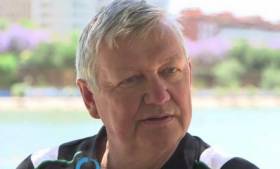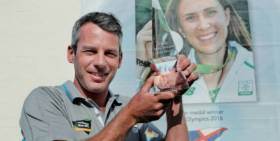Displaying items by tag: Morten Espersen
Casey Nominated for Top Coaching Award
#Rowing: Ireland coach Dominic Casey has been chosen as one of the finalists for the Coach of the Year at the World Rowing Awards for the second successive year. Casey coaches the Ireland lightweights, who had an extraordinary 2017.
The lightweight pair of Mark O’Donovan and Shane O’Driscoll capped a year of wins in the World Cup events and the European Championships with a World Championship gold. Paul O’Donovan also took top position on the podium in Florida after winning the lightweight single sculls. He and his brother Gary had taken two World Cup medals and a European Championship silver in the lightweight double. Denise Walsh was a World Championship finalist and took medals at the European Championships and the World Cup in Belgrade. The Ireland lightweight quadruple and the lightweight pair of David O’Malley and Shane Mulvaney took medals at the World Under-23 Championships.
Casey has also been nominated for an award for Distinguished Services to International Rowing. Former Ireland high performance director, Morten Espersen, is also a nominee for this award.
Ireland Rowing HPD Espersen Resigns
#Rowing: The high performance director of Rowing Ireland, Morten Espersen, has resigned. Espersen emailed his decision to the chief executive of Rowing Ireland, Hamish Adams.
“On behalf of the entire Board and Staff I wish Morten well in the next phase of his professional and personal life and would like to personally thank him for his huge contribution to rowing in Ireland over the last four years,” Adams said.
“Morten will be working closely with us for the next three months to ensure our high performance programme continues to go from strength to strength.”
Olympic Watersport Coaches Share Philips Award For August
The Philips Sports Manager of the Month for August is being shared by the two succesful Olympic medal winning coaches – both in waterports – from Rio.
Irish Sailing Association Olympic coach Rory Fitzpatrick and Morten Espersen, the High Performance Director and Olympic Manager with Rowing Ireland are joint winners of the prestigious award for the month of August.
The award is an acknowledgement of the success of sailor Annalise Murphy and rowers Gary and Paul O’Donovan at the Olympic Games in Rio.
Annalise and the O'Donovan brothers brought home silver medals in the Laser Radial Sailing and Lightweight Double Sculls rowing categories respectively.
The sailing medal was the first since Moscow in 1980 and the O’Donovan brothers secured the first ever medal for Ireland in rowing.































































